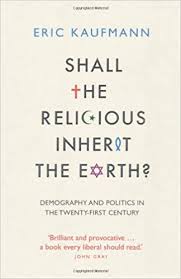From the comments:
I think what’s underappreciated is that hindu nationalism is partly caused by the collapse of the caste system. I know that may not intuitively make sense at first, but compared to when I was a boy the caste system has significantly weakened. People are finally starting to look at each other as hindus rather than by caste – and this has never been the case in the past. Obviously caste is still here and we all have a long way to go but it is substantially weakened and weaker than its ever been. I believe this is the major cause for the rise of hindu nationalism.
 One of the strange things that surprises many people is that modernization often produces stronger and more robust confessional identities. In Eric Kaufmann’s Shall the Religious Inherit the Earth? Demography and Politics in the Twenty-First Century he talks about the fact that urbanization and increased access to educational opportunities for the rural middle-class in Muslim countries resulted in gains in power to Islamist movements. The reasons are manifold, but one issue is that local power blocs centered around customary and traditional relationships and patronage networks were disrupted by development. In a flatter and more deracinated landscape simple and universal Islamist messages were appealing.
One of the strange things that surprises many people is that modernization often produces stronger and more robust confessional identities. In Eric Kaufmann’s Shall the Religious Inherit the Earth? Demography and Politics in the Twenty-First Century he talks about the fact that urbanization and increased access to educational opportunities for the rural middle-class in Muslim countries resulted in gains in power to Islamist movements. The reasons are manifold, but one issue is that local power blocs centered around customary and traditional relationships and patronage networks were disrupted by development. In a flatter and more deracinated landscape simple and universal Islamist messages were appealing.
You see the same process happening in Indonesia. Traditional Islam among the Javanese is syncretistic. But its power and strength are in the solidities of the rural cultural order which has deep local roots. Development and migration to urban areas result in a shift toward more world-normative (santri) Islam which is not contingent on local cultural and social frameworks.
In this model then the economic liberalization ushered in by the Congress Party in the early 1990s sowed the seeds for the emergence of a broad-based Hindu nationalism, as economic dynamism and urbanization begins to erode the older caste-based solidities.